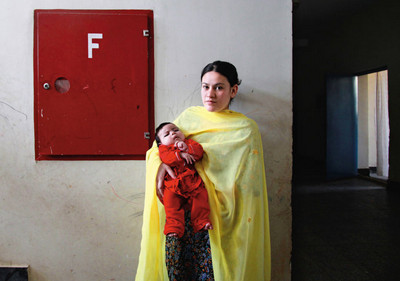In Badghis, a nine-year-old girl was sexually attacked by 11 men including four policemen. Fareed Akhizai, head of Badghis provincial council, says the incident was in Jowand. “The girl’s father is dead. Armed men forcibly gave her in matrimony for 750,000 Afs (10,900 USD)after she was sexually harassed. The mother and grandmother came to the Badghis capital to complain to the police commandant and provincial council,” says Akhizai.
Abdul Rauf, police commander of Badghis, also confirms the case and promises speedy investigation but no assurance on whether the perpetrators would be arrested.
Civil society groups held a press conference. Fardeen Fedayee, head of Afghanistan Youth Civil Society, commenting on the recent crimes against women and girls says he fears violence will only keep rising. He blames the government for not acting against criminals. “The incident in Badghis is a big crime. The government should try the criminals otherwise we will launch country-wide demonstrations.”

NPR, Sep. 6, 2015: According to Human Rights Watch, there has been an increase of such incarcerations: "The number of women and girls imprisoned for 'moral crimes' in Afghanistan has increased by 50 percent in the period from October 2011 to May 2013."
Afghanistan Independent Human Rights Commission (AIHRC) considers the current year, starting Mar 21, 2015 to Mar 19, 2016, shocking from the viewpoint of violence against women. AIHRC has recorded some 2,950 cases of brutalities in the first seven months of the year. Dr Rafiaullah Bedar, spokesperson, says the incidents include beating and cutting off body parts of the victims. “Women and children have been sexually harassed. There were murders – so-called honour killings,” he says.
On the basis of information, Bedar says Herat, Badghis, Baghlan and Takhar provinces seem to have been most dangerous for women and children.
Latifa Sultani, the coordinator for women’s rights in AIHRC, says there were 190 murders in the name of family honour including three cases where women were stoned to death. These cases were reported from areas under Taleban control.
Record suicides
Hospitals in Herat have received a record number of attempted suicide cases. In the first two months of the year, there were 60, all but three were women. Mohammad Rafiq Sherzoy, the spokesperson of Herat regional hospital told Killid, “Some tried to kill themselves with rat poison.”
The most recent case, he says, is of a 35-year-old pregnant woman who was brought to hospital for rat poisoning but died of knife injuries. Her husband had attacked her with a knife seconds after she ate rat poison.
Will her husband be tried for murder? Mary Maihanyar, the prosecutor in the office for elimination of violence against women in the Herat Attorney-General’s says, “There were 22 honour murders in the first nine months of the year. The figure was 18 for the same period last year. Arrests have been made in 80 percent of the cases.”
There are women in prison whose only crime was they fled their homes. Human rights activists say there are 28 such cases in Baghlan prison. They complain of harassment from prison officials and other prisoners with influence. “These women (those who have links with government officials) get other prisoners to do their work. They trade in mobile phones and beat up anyone who does not listen to them. There are also instances of male prison officials sexually harassing prisoners. They dare not complain,” says Arzo, a women’s activist who visited Baghlan prison and interviewed prisoners.
She cites another case of a 20-year-old prisoner, a married woman who fled the violence at home. She was arrested and has been in prison for a year. The woman faced constant harassment from a fellow prisoner. “I cannot complain because the prison officials support her,” she told Arzo.
Presidential intervention
President Ghani has said that a neutral commission of women lawmakers and civil society activists should be formed to monitor the processing of cases of women prisoners. The Supreme Court has appointed a delegation to follow-up on all complaints from prisoners. Chief Justice Abdul Salam Azimi has promised a “comprehensive investigation” into all complaints and results will be submitted to the president’s office. The president directed the authorities concerned to form a commission of women lawmakers and civil society activists to monitor trial of women cases. He said a special court would be formed to stop the influence of some people on the trial of cases.
The Afghan president visited the Badam-e-Bagh women’s prison following a representation from Anjoman e Paiwand e Afghanha which had conducted a survey of women prisoners and found they did not have access to legal facilities and lawyers. The research was conducted in Balkh, Helmand, Herat, Kandahar and other provinces. The study concluded judicial offices, Ministry of Justice, and Supreme Court don’t give priority to cases of justice for women. Women detained in cases are victimised from the time of their arrest till their release. There are roughly 280,000 women prisoners in Afghan jails.
According to media reports, President Ghani said that the order to release 40 women inmates was almost complete.
He said that he was monitoring implementation of such decrees himself to avoid wrong use of these orders. He said he had also ordered the relevant agencies to restart trials of prisoners.
Originally published on Jan. 17, 2015



